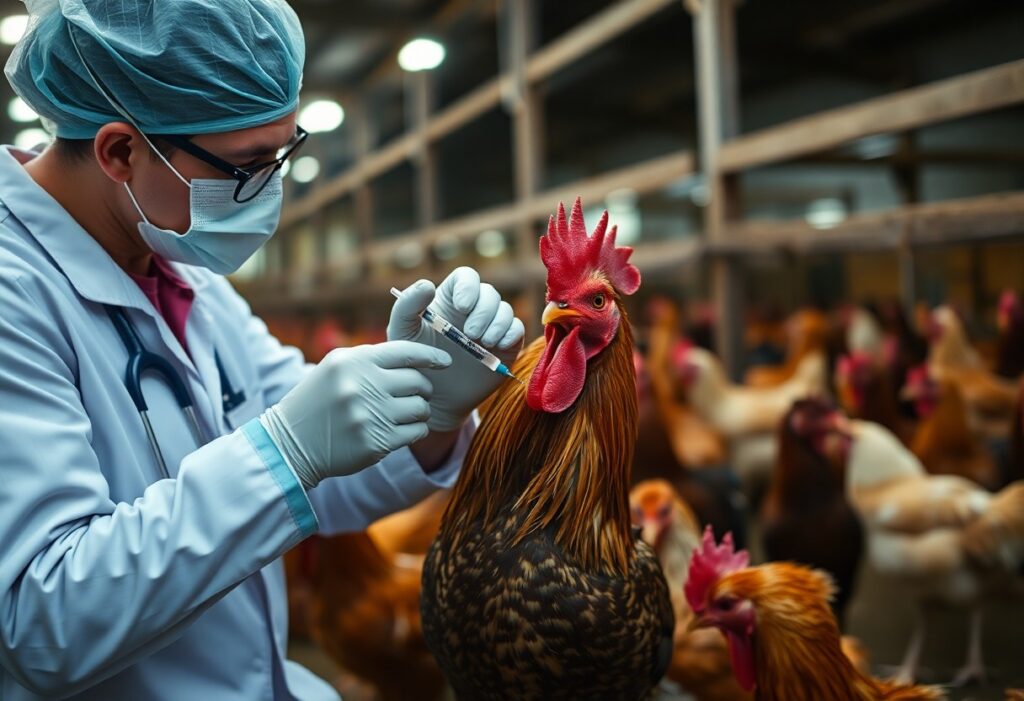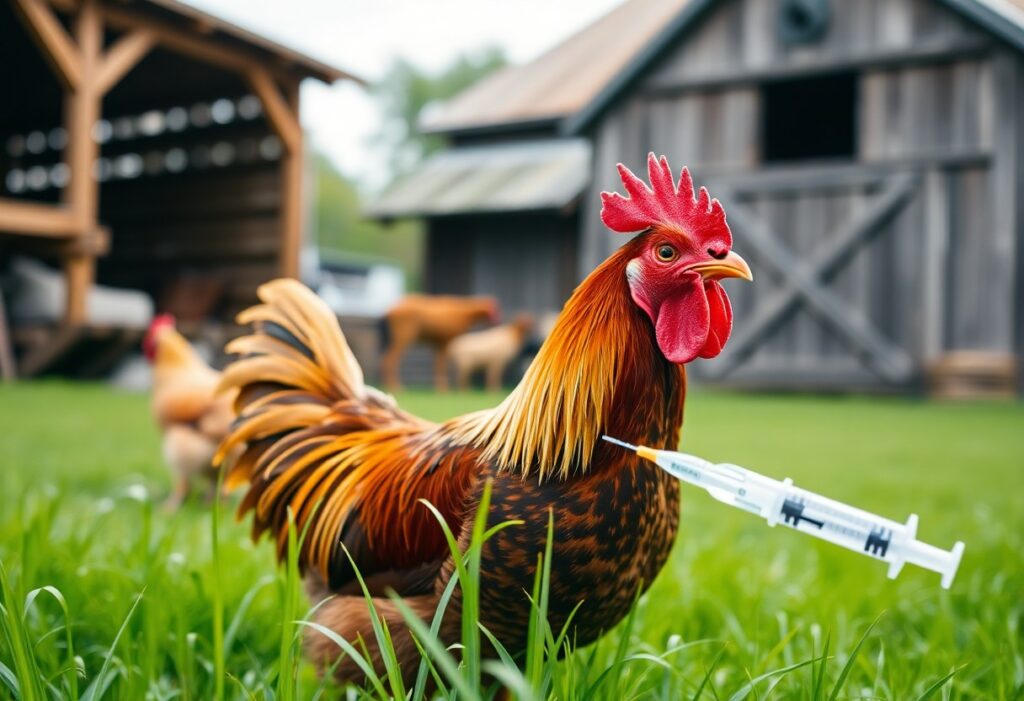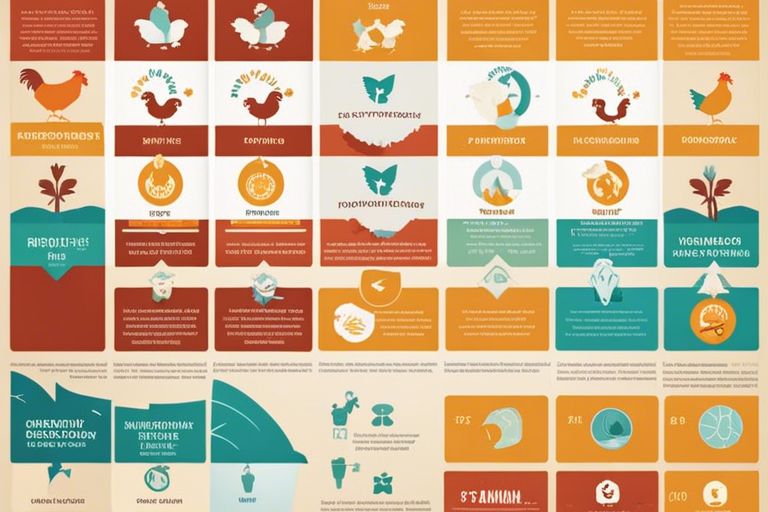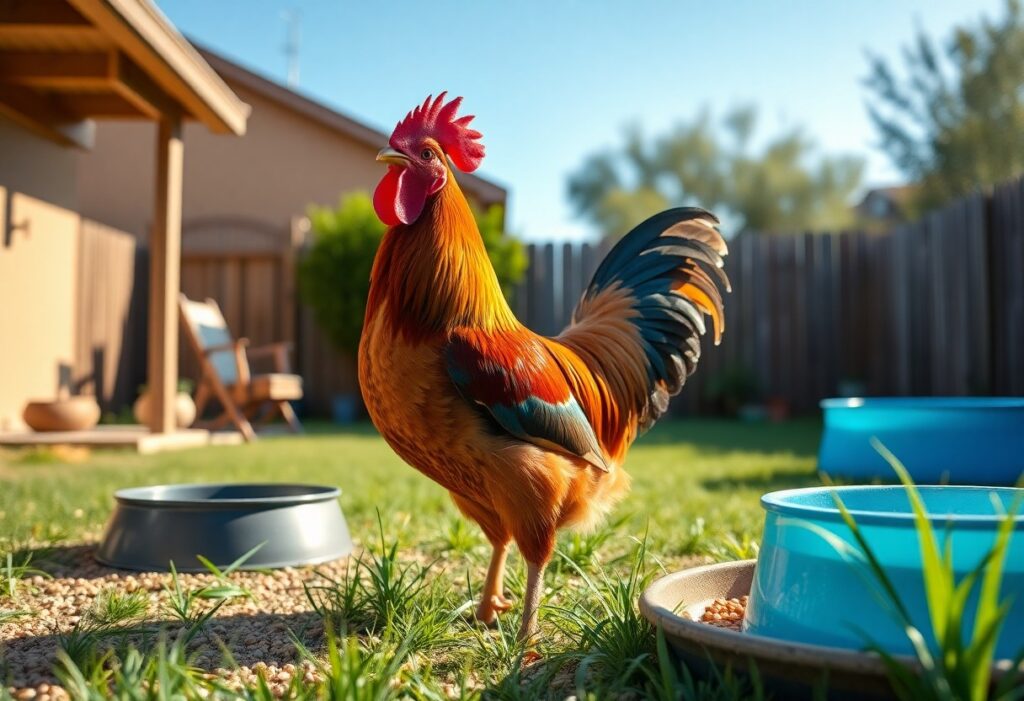Rooster vaccination is an necessary practice that you should prioritize to maintain optimal health in your flock. By protecting your roosters from various diseases, you not only ensure their well-being but also safeguard the entire flock against potential health crises. Proper vaccination can prevent serious outbreaks of illnesses that can decimate your birds, ultimately leading to financial losses and emotional distress. Understanding the importance of vaccination and staying informed about the necessary schedules can significantly enhance your poultry management efforts.
Key Takeaways:
- Rooster vaccination plays a vital role in controlling the spread of infectious diseases within poultry flocks, contributing to overall flock health and productivity.
- Regular vaccination schedules for roosters can prevent outbreaks, ensuring higher survival rates and improved egg production in breeding systems.
- Integrating vaccination with other biosecurity practices can lead to a more comprehensive approach to managing flock health and reducing veterinary costs.
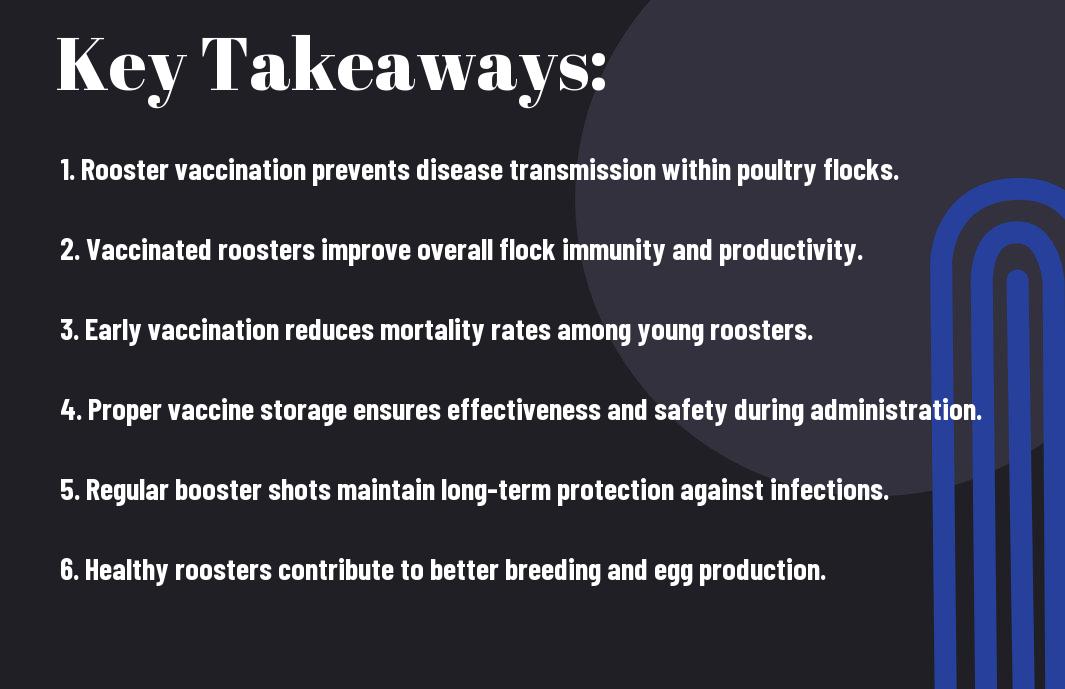
Importance of Rooster Vaccination
The health of your flock significantly depends on proper vaccination of roosters. Vaccinating your roosters helps to create a robust immune system, ensuring they remain healthy and can effectively contribute to the overall wellness of your hens. As primary caregivers for their flock, roosters play a vital role in protecting your birds against disease, making their vaccination a necessity for any responsible poultry owner.
Role in Disease Prevention
Any flock owner knows that preventing disease is important for maintaining a healthy and productive group of birds. By vaccinating your roosters, you significantly mitigate the transmission of harmful pathogens, thereby safeguarding the entire flock. This proactive measure helps create a defense barrier, ensuring that virulent diseases do not disrupt your poultry operation.
Impact on Flock Productivity
Below optimal health conditions, flock productivity can severely decline, affecting your overall yield. Rooster vaccination directly influences the reproductive success of your hens, leading to a higher hatch rate and healthier chicks. You will witness a more vibrant and energetic flock, which translates into better egg production and overall growth.
Productivity improvements from vaccinating your roosters can be marked and noticeable. When your roosters are healthy, they stimulate higher egg production, which is vital for your operation’s success. Furthermore, rooster vaccination reduces the risk of disease outbreaks, leading to fewer losses and improved flock consistency. This means greater profitability for you as a poultry owner, as you can rely on a robust and thriving flock that boosts your revenue and meets your production goals.
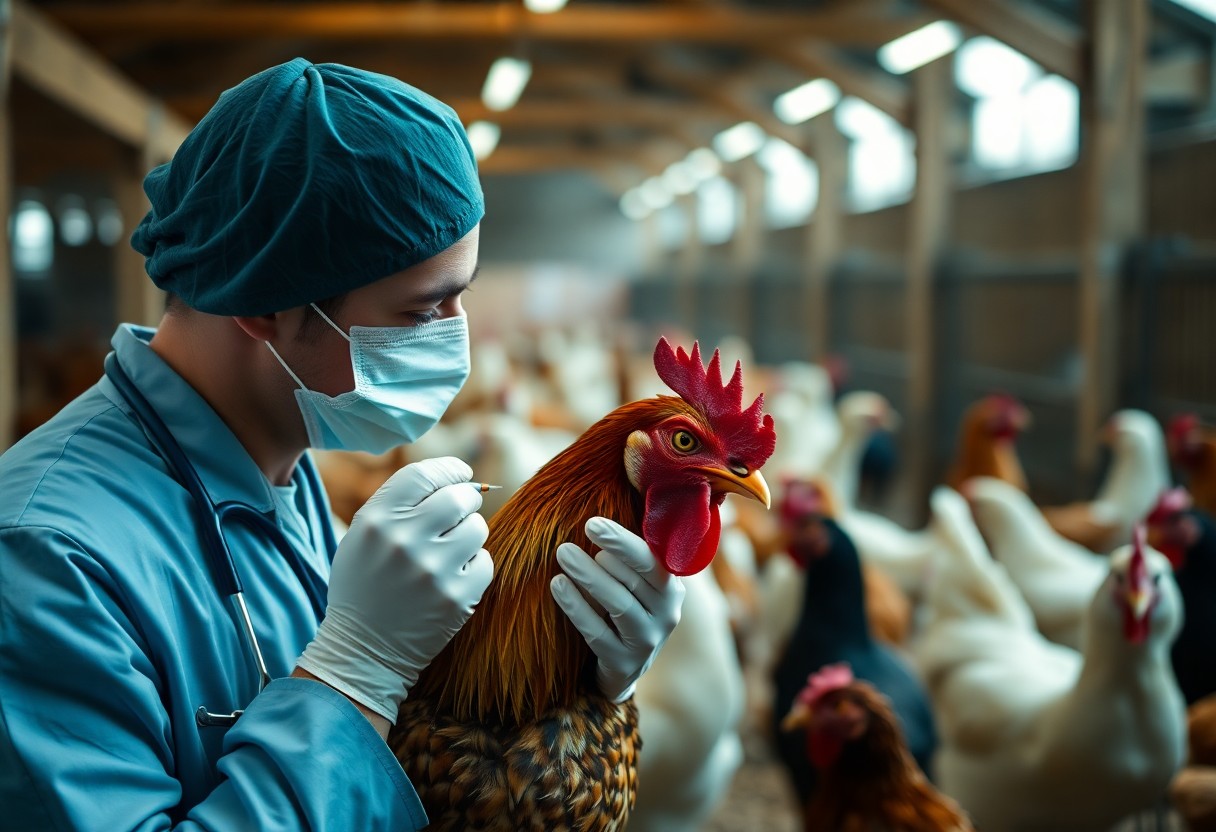
Common Diseases Vaccinated Against
Even with proper care, your flock can still be vulnerable to infectious diseases. Vaccinating against common diseases is a vital part of maintaining the health of your roosters. These vaccinations protect not only your birds but also the overall productivity of your flock, ensuring they thrive in a safe environment.
Infectious Bursal Disease
Across your flock, Infectious Bursal Disease (IBD) can severely weaken your birds’ immunity, leaving them open to other infections. This viral disease can lead to high mortality rates, especially in young chicks. Vaccination is key to preventing IBD and ensuring your birds remain healthy and robust.
Newcastle Disease
Diseases like Newcastle Disease pose significant risks to your flock, leading to high mortality and severe economic loss. This highly contagious viral illness affects various age groups and can spread rapidly among birds, making vaccination crucial to protect your investment.
Understanding Newcastle Disease is vital for maintaining optimal flock health. This highly contagious virus can spread through respiratory droplets, contaminated equipment, or even asymptomatic carriers. Infected birds may exhibit symptoms like coughing, nasal discharge, and nervous system issues, resulting in high mortality rates. By vaccinating your flock, you develop immunity against this dangerous disease, ensuring your roosters remain healthy and productive for your needs.
Vaccination Protocols
Not having a well-defined vaccination protocol can lead to serious health issues within your flock. To maximize the benefits of vaccination, it’s necessary to establish a systematic approach that includes appropriate vaccines, timing, and administration methods. Tailoring your vaccination strategy to your specific flock, their age, and any existing health concerns will ensure better protection against disease outbreaks and enhance overall productivity.
Timing and Frequency
Among the key elements in your vaccination protocol, timing and frequency play a vital role. You need to be mindful of your flock’s age and health status to determine the best vaccination schedule. Generally, younger birds require more frequent vaccinations to build immunity against specific diseases. Regularly assessing your birds will help ensure that they are protected at the right intervals.
Administration Methods
Vaccination methods can vary significantly depending on the type of vaccine you are using. Vaccination can be administered through oral, injectable, or aerosol methods, and each has its own sets of benefits. Choosing the right method will depend on the disease being targeted, the age of your birds, and the resources you have available.
But before deciding on a vaccination method, you must understand the implications of each approach. For instance, injectable vaccines provide a more direct immune response but require specialized handling and administration skills. On the other hand, oral vaccines can be easier to administer but may have variable efficacy depending on how well your birds consume the vaccine. Similarly, aerosol methods offer a quick solution for larger flocks but can pose challenges in terms of environmental factors affecting delivery. Therefore, you should analyze the advantages and disadvantages of each method in relation to your flock’s unique circumstances and consult with a veterinarian to make informed decisions.
Selection of Vaccines
After identifying the health needs of your flock, it’s vital to select appropriate vaccines. The right vaccines help in boosting your chickens’ immunity against specific diseases. You should consider the age, health history, and environment of your roosters to determine which vaccines are most suitable for their protection. Consulting with a veterinarian can ensure you make informed choices regarding vaccination.
Types of Vaccines Available
Beside traditional vaccines, a variety of vaccine types are available to protect your flock, including:
| Live Attenuated Vaccines | These vaccines use weakened forms of pathogens. |
| Inactivated Vaccines | These contain killed pathogens to stimulate an immune response. |
| Subunit Vaccines | These contain only parts of pathogens, like proteins. |
| DNA Vaccines | These introduce genetic material to provoke an immune reaction. |
| M-Vector Vaccines | These use live vectors to deliver protective antigens. |
Perceiving the diversity in vaccines can help you tailor a vaccination strategy specifically for your flock’s needs.
Factors to Consider in Vaccine Choice
At the time of choosing a vaccine, you should evaluate several important factors:
- Egg Production requirements and potential effects.
- Age of your flock influences vaccine efficacy.
- Geographic location and prevalent diseases in your area.
- Health history of your birds, especially previous vaccinations.
- Cost versus benefit analysis of vaccines.
After considering these factors, you will be better equipped to make informed vaccination decisions.
Due to the complexity of vaccine choices, it is vital to assess aspects such as age, health status, and local disease prevalence. Each factor plays a role in ensuring that your flock receives optimal protection from diseases. Collaborating with a veterinarian can provide valuable insights tailored to your specific needs and circumstances. Evaluating the cost and benefit of each vaccine will also help you make the best choices for your flock. After understanding these considerations, you can confidently proceed with your vaccination plan.
Monitoring and Follow-Up
Now that your roosters are vaccinated, ongoing monitoring and follow-up are important to ensure the vaccines are performing as intended. This involves observing your flock for any signs of illness or adverse reactions, as well as conducting regular health checks. By closely monitoring the birds, you can better identify trends, make informed decisions, and adapt your management practices to support the overall health of your flock.
Assessing Vaccine Efficacy
Efficacy can be evaluated through regular health assessments and observing the prevalence of diseases within your flock. Monitoring the immune response can provide valuable insights into how well the vaccination program is working. Assessing factors such as the overall health, activity levels, and any occurrences of vaccine-preventable diseases will guide you in identifying any necessary changes to the health management plan.
Record Keeping and Reporting
Follow-up with precise record-keeping is vital to track vaccine administration and subsequent flock health outcomes. Comprehensive records enable you to identify patterns and assess the overall effectiveness of your vaccination strategies. Accurate documentation supports confident decision-making regarding future vaccinations and health interventions.
At the core of effective record keeping and reporting is maintaining a detailed log of each vaccination, including dates, batch numbers, and any side effects encountered in your roosters. Keeping track of these important details not only simplifies future vaccinations but also provides a valuable resource for evaluating vaccine efficacy. In cases where issues arise, well-organized records will allow for prompt communication with your veterinarian, helping you address any vaccination-related concerns in a timely manner and ensuring the continued health of your flock.
Challenges in Rooster Vaccination
All vaccination efforts face various challenges, and rooster vaccination is no exception. Issues such as vaccine hesitancy among farmers, logistical difficulties, and associated costs can greatly affect the overall success of vaccination programs. These barriers may prevent you from fully investing in the health of your flock, ultimately putting your birds and profits at risk.
Vaccine Hesitancy among Farmers
Around many farming communities, there is a significant level of hesitation regarding vaccine use for roosters. This reluctance often stems from a lack of understanding or misinformation about the benefits of vaccination. As a farmer, educating yourself and your peers about the positive impacts of vaccines on flock health can help combat this issue and promote a healthier environment for your birds.
Logistics and Costs
Logistics pose another challenge in rooster vaccination. Ensuring that vaccines are stored and transported under proper conditions can be difficult, which may compromise their effectiveness. Additionally, costs associated with vaccinations can discourage you from pursuing these necessary health measures. It’s vital to assess your flock’s needs and budget to create a vaccination plan that is both effective and financially viable.
Considering these factors, effective planning and resource allocation are vital for successful rooster vaccination. Assessing your local vaccination services can help streamline logistics, while budgeting appropriately ensures you are equipped to handle any financial constraints. By prioritizing vaccination, you safeguard your flock’s health and enhance your farm’s productivity. Ensuring that vaccines are administered effectively can mitigate the risks of disease outbreaks, making it a worthwhile investment in your operation’s long-term success.
Final Words
With these considerations, you can see that rooster vaccination is an imperative element in maintaining the health of your flock. By proactively protecting your birds from common diseases, you not only enhance their well-being but also improve productivity and longevity. Integrating a regular vaccination schedule tailored to your specific environment will help you mitigate risks and ensure a thriving, vibrant flock for years to come. Prioritizing vaccination is a smart investment in the health of your poultry operation.
FAQ
Q: What are the main vaccinations that roosters need for optimal health?
A: Roosters, like other chickens, require vaccinations to protect them from various diseases. The primary vaccinations include the Marek’s disease vaccine, which helps prevent this highly infectious virus; the Newcastle disease vaccine, which is important for preventing respiratory illness; and the Infectious Bursal Disease vaccine, which is vital for maintaining the immune system. Depending on the region and specific environmental factors, other vaccinations may also be recommended to protect against additional diseases.
Q: How does vaccinating roosters contribute to overall flock health?
A: Vaccinating roosters not only protects the individual bird but also plays a significant role in the health of the entire flock. Healthy roosters can help maintain a robust breeding stock, contributing to the prevention of disease transmission within the flock. When vaccination is part of a comprehensive health management program, it reduces the likelihood of outbreaks that can affect both production and the well-being of all birds in the flock, ensuring a healthier and more productive environment.
Q: At what age should roosters be vaccinated, and how often do they need follow-up vaccinations?
A: Roosters should ideally be vaccinated as chicks, typically at one day of age for Marek’s disease and later for other vaccines as recommended. Follow-up vaccinations vary based on the type of vaccine and local guidelines. For instance, some vaccines may require boosters every year, while others may provide long-term immunity. It’s important for poultry owners to consult with a veterinarian or local extension services to create an appropriate vaccination schedule tailored to their birds’ needs.
